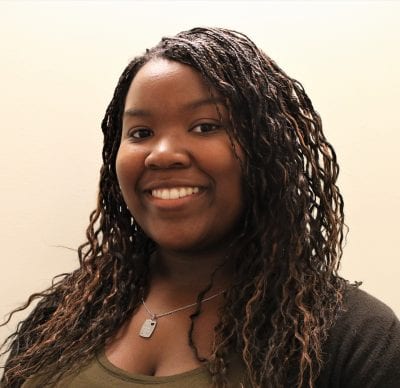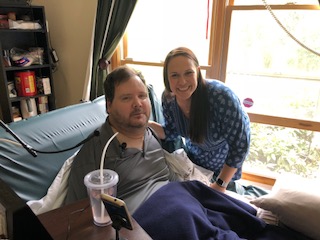
Congratulations to our PhD student Mallory Perry elected to be the student member representative on the Board of the International Society of Nurses in Genetics (ISONG)!

Congratulations to our PhD student Mallory Perry elected to be the student member representative on the Board of the International Society of Nurses in Genetics (ISONG)!
Pain researcher and geneticist, Dr. Erin Young, visits with Jeff Blocker about his experience with visceral pain, a condition he has suffered with for over 20 years. At the age of 21, Jeff had a cervical spinal cord injury while serving in the military. Since that time, he’s experienced neuropathic and visceral pain, but for him the visceral pain is at times unbearable. Approximately 70% of patients with spinal  cord injury experience chronic pain with at least one third having severely intense pain that impacts mood, function and quality of life. As part of her translational research program, Dr. Young uses rodent models to study the c
cord injury experience chronic pain with at least one third having severely intense pain that impacts mood, function and quality of life. As part of her translational research program, Dr. Young uses rodent models to study the c
ellular mechanisms of visceral pain and also collects specimens from humans to investigate genetic variants that may contribute to visceral pain in patients with spinal cord injuries, irritable bowel syndrome and inflammatory bowel disorders. Her meeting with Jeff, one of the Center for Advancement in Managing Pain’s community partners, provided her with some insights on his experience with visceral pain, and some added inspiration for continuing her work in this area. For more information about Dr. Young’s lab, visit her webpage and Jeff’s story can be found at the following link.
The Connecticut Pain Consortium will focus on a problem of national importance: the need for fundamental and translational research on the causes and manifestations of pain, pain management, and education about pain and its ramifications. CAMP member and Professor Reinhard Laubenbacher, who will lead the consortium and is a joint faculty member at UConn Health and The Jackson Laboratory, said the consortium will focus on researching the causes of pain, as well as pain management and how to translate that research into new therapies. Read more at this link , the Courant and Hartford Business websites.